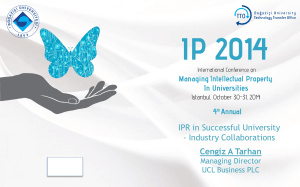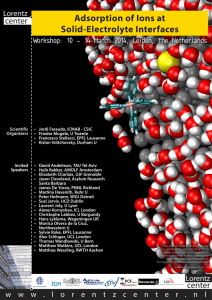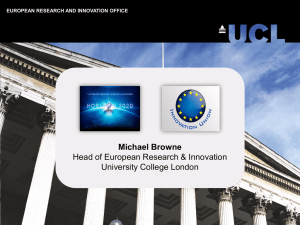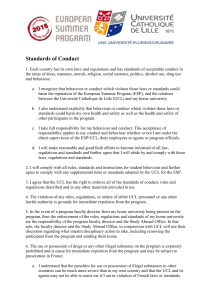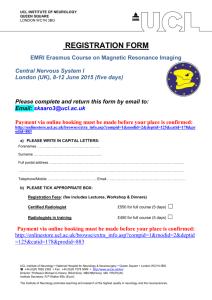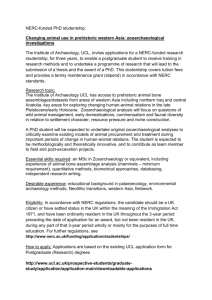Job Description - University College London
advertisement
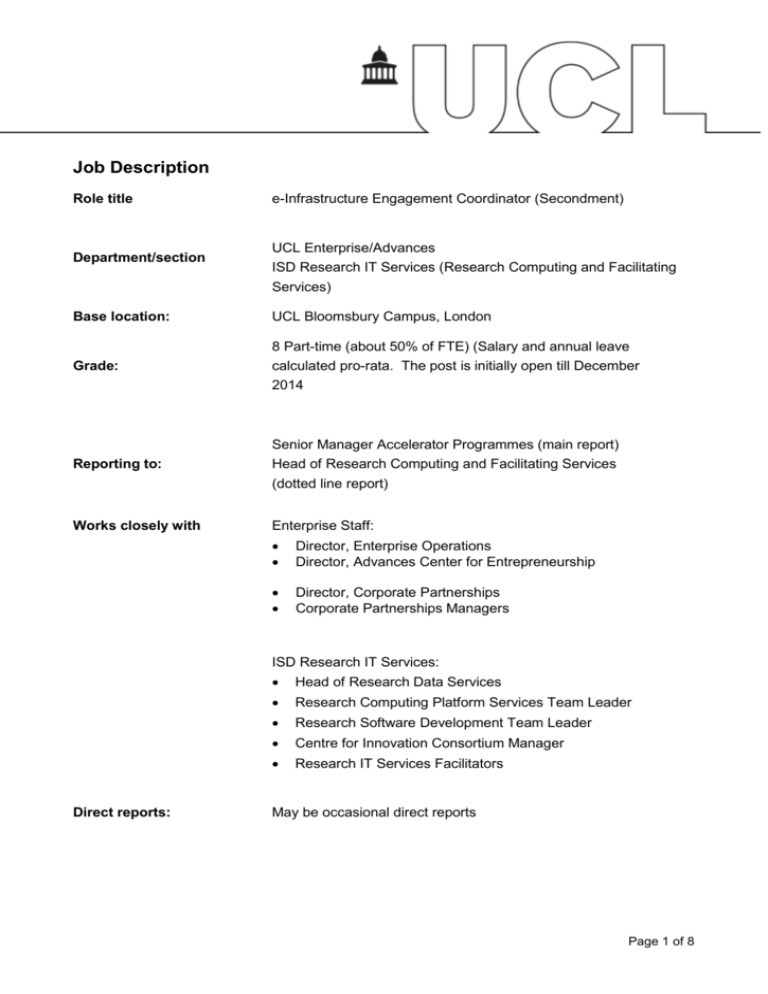
Job Description Role title Department/section e-Infrastructure Engagement Coordinator (Secondment) UCL Enterprise/Advances ISD Research IT Services (Research Computing and Facilitating Services) Base location: UCL Bloomsbury Campus, London Grade: 8 Part-time (about 50% of FTE) (Salary and annual leave calculated pro-rata. The post is initially open till December 2014 Reporting to: Senior Manager Accelerator Programmes (main report) Head of Research Computing and Facilitating Services (dotted line report) Works closely with Enterprise Staff: Director, Enterprise Operations Director, Advances Center for Entrepreneurship Director, Corporate Partnerships Corporate Partnerships Managers ISD Research IT Services: Direct reports: Head of Research Data Services Research Computing Platform Services Team Leader Research Software Development Team Leader Centre for Innovation Consortium Manager Research IT Services Facilitators May be occasional direct reports Page 1 of 8 Working context UCL – a university, a community, a world-class reputation … UCL (University College London) is one of the UK’s leading universities, a world-class multidisciplinary research and teaching institution, whose staff and former students have included 26 Nobel Prize winners. Founded in 1826, UCL was the first university in England to admit students regardless of race, religion or gender. It continues to thrive on the creativity and diversity of its community, which today comprises 10,000 staff, 13,000 undergraduates and 9,000 graduate students from 130 countries across the globe. Constitutionally part of the federal University of London, UCL is in practice an independent university, with an annual turnover of over £800 million. Its 70 departments span arts and humanities, social and historical sciences, law, architecture and the built environment, engineering sciences, mathematical and physical sciences, life and clinical sciences, and medicine. UCL includes academic units as diverse as the UCL Slade School of Fine Art, the UCL Bartlett School of Architecture and the UCL Institute of Child Health, which is associated with Great Ormond Street Hospital. UCL was ranked 4th in the QS World University ranking for 2012. Situated at the heart of one of the world’s greatest cities, UCL’s historic central campus in Bloomsbury is within easy reach of several rail and underground stations, the Eurostar terminal and Heathrow airport. The working context comprises three principle actors within UCL: UCL Enterprise, UCL Information Services Division and the e-Infrastructure South Centre for Innovation. UCL Enterprise UCL Enterprise provides UCL’s structures for engaging with business for commercial and societal benefit. It includes three units: UCL Advances, UCL Business and UCL Consultants. Together, they provide access to the capabilities and resources of the UCL community to help businesses start, grow and develop, and manage successful long-term relationships between industry and UCL for corporate and academic needs. UCL Information Services Division UCL Information Services Division (ISD) comprises 280 staff and provides a wide range of information and technology related services to the University, divided between three main areas of activity: i) shared services groups ii) customer facing groups and iii) two Departments focussed on delivering world class IT support for Research and for Teaching & Learning. The Research IT Services Department (RITS) is specifically tasked with providing IT services to enable and support UCL research and includes the Group that cover core areas of e-Infrastructure: Page 2 of 8 Research Computing Platforms (such as High Performance Computing, HPC), Research Software Development and Research Data Services. The Centre for Innovation, SES-5 The Centre for Innovation (CfI) is a shared High Performance Computing (HPC) facility jointly owned and operated by the Universities of Bristol, Oxford, Southampton and UCL. The CfI was established in 2012 with £3.8m of funding from the Engineering and Physical Science Research Council (EPSRC) as the largest of several regional or ‘Tier 2’ HPC facilities intended to support and promote increased levels of industrial engagement and collaboration based around the use of ‘e-Infrastructure’, as well as advancing the research objectives of the institutional partners, particularly with respect to facilitating collaboration between their research communities. The CfI comprises two significant HPC systems; EMERALD and IRIDIS, the former the largest GPGPU cluster in the UK. The CfI’s parent Consortium, the SES-5 (South East Engineering and Science 5) plans to develop other e-Infrastructure services via this shared ownership model in the future. Job purpose ‘e-Infrastructure’ encompasses the compute, data storage, network, people, software and skills – frequently distributed – involved in realising the benefits of advanced ICT for research and innovation. Following a major review of the UK’s e-Infrastructure in 2011/12 it is anticipated that future funding for this area across academe will be tightly coupled with a drive to dramatically increase industrial uptake, primarily via regional e-Infrastructure ‘hubs’ such as the Centre for Innovation (http://www.einfrastructuresouth.ac.uk/cfi/the-centre-for-innovation, CfI) of which UCL is a founding partner. The main purpose of this post is to drive the use of e-Infrastructure services by local and/or regional SMEs, as well as facilitating engagement, collaboration and knowledge exchange the between academic researchers and industrial and other commercial organisations based around their use of e-Infrastructure services. The focus of this will (initially at least) be the services offered by and through the Centre for Innovation, but will also include other ‘e-Infrastructure’ services offered by UCL RITS and/or the SES-5. Additionally, the post will be tasked with facilitating collaboration between researchers from different CfI partner institutions, and between different Departments and Faculties within UCL, based around use of e-Infrastructure services. Key Objectives Page 3 of 8 The Key Objectives of the post are outlined below: Key Objectives % time spent To identify industrial and other commercial organisations that may be benefit from access to UCL e-Infrastructure services and facilities (including those provided by the CfI). 20 Working in collaboration with the CfI Consortium Manager and others, to create business cases for use of these services and facilities by industrial and other commercial organisations identified above. 20 To develop a roadmap for successful industrial engagement for UCL eInfrastructure services and facilities, working with colleagues to drive the implementation of this roadmap. 10 To develop a communication and promotion strategy to assist in meeting the above objectives, working with colleagues to drive the implementation of this roadmap. 10 To identity, pursue and develop opportunities for collaboration between UCL researchers and local/regional industry based on use of e-Infrastructure services and facilities, particularly those provided by the CfI. 10 To develop metrics for successful industrial engagement/collaboration based on existing commercial exemplars and with reference to all stakeholder groups. 10 To explore, analyse and articulate service development priorities for UCL eInfrastructure services and facilities based on needs of industrial/commercial sector users. 20 Principle Responsibilities To develop and maintain a full and up to date knowledge of all relevant Enterprise services/partnerships and their applications and benefits To develop and maintain a full and up to date knowledge of all relevant RITS services and their applications and benefits To develop and maintain a full and up to date knowledge of all CfI services and their applications and benefits To Participate in identifying and maintaining key partnerships relevant to the Key Objectives of the post, many of which have a strong research component, and ensure that relationships move forward to successful contractual outcomes. To promote UCL Enterprise as a centre of expertise and potential partnership within the local and regional industrial community. To promote UCL RITS as a centre of expertise and potential partnership within local and regional industrial community. To identity, pursue and develop opportunities for collaboration between RITS staff and local/regional industry based on use of UCL/Cfl e-Infrastructure Page 4 of 8 To develop and maintain effective working relationships with RlTS and Cfl Service Leads and Owners to support the programme of industrial engagement outlined above As the key point of contact for UCL CfI relationships with industrial partners UCL, to be responsible for the identification, development and maintenance of partnerships and support the strategic negotiation of milestone agreements and contracts where appropriate; To network and liaise to influence decision-making at senior levels in industry, government and academe, including other CfI partners. To be responsible for identifying and developing business models for income streams into UCL by connecting with leaders in the industry and identifying and developing CfI related opportunities To ensure that high-level partnership strategic aims are met; encourage academics to engage in the development of lower-level strategies that feed into this. To help ensure the smooth running of partnership activities and their relationship with other UCL support departments – such as Research Contract Services – where appropriate. To Ensure that the Senior Manager Accelerator Programmes and Head of Research Computing and Facilitating Services are apprised of all discussions and projects on a regular basis, and produce regular updates and monthly reports, which capture milestone developments. To make regular contact with business, government, the media, professional and social groups and scientific leaders, both inside and outside UCL to promote the partnership activity and to create economic impact in London and the UK – as appropriate To promote UCL Enterprise, UCL RITS and the UCL brand and corporate identity via media and other contacts to the outside world. Reflect the culture and ensure that all outputs are consistent with branding strategy and principles of good design. To co-ordinate proposals, produce succinct minutes of meetings, compose PowerPoint presentations with market analyses, financial charts, visuals, where appropriate. To ensure that backup administrative tasks relating to the partnerships function.(minutes, documents, PowerPoint presentations, events, promotional material, ) are completed and stored appropriately, and delegate/monitor tasks accordingly. To be responsible for developing sector market intelligence. Manage sector presentations and take responsibility for co-ordination, planning and communications of sector concerns and initiatives. To encourage good practice in all aspects of commercial presentation and analysis To develop an understanding of different partnership models To maintain awareness of commercial funding opportunities and report opportunities where appropriate. As appropriate to the role, to represent UCL on internal and external committees, and at conferences. Page 5 of 8 To co-ordinate events and workshops for stakeholders including academics, business representatives and the general public. Supervise the creation of appropriate marketing materials as necessary. To work towards the development of a portfolio of partnership ‘services’ and case studies. To encourage multi-disciplinary projects or initiatives as a way of enabling partnership growth. As appropriate to the role, to coordinate web site and other promotional material in a manner consistent with branding strategy. Other Duties To advise academics by way of participation in appropriate meetings and publications. To liaise with other Enterprise functions in UCL and in other institutions To liaise with other central IT functions in UCL and in other institutions as may occasionally be appropriate To undertake all other tasks commensurate with the nature and responsibility of the role (e.g. attend sector and industry events) Knowledge, Skills and Experience A high level of specialised scientific, engineering, or computing knowledge generally acquired by postgraduate academic study (e.g. MSc,PhD) and/or professional commercial experience. Readiness to engage in continuous professional development activities to keep knowledge base and skills up to date and to develop them further. Innovative approach – ideally learned in a fast moving corporate environment. Essential 1. Degree or equivalent professional experience. 2. Experience of initiating and leading project or partnership activity and maximising relations with relevant parties and services. 3. Experience in commercial best practices (e.g. in finance, commercial law, organisation, strategy) 4. Demonstrably high level of IT literacy. 5. Demonstrable analytical and problem solving skills. 6. Ability to effectively present complex or technical information effectively to a range of audiences. 7. Excellent written and verbal communication skills. Page 6 of 8 8. Proven ability to forge effective professional relationships at all levels 9. Ability to work collaboratively and as part of a team. 10. Ability to work independently and under own initiative. 11. Proven ability to manage multiple concurrent tasks and activities, working to deadlines and prioritising as appropriate. 12. Proven organisational skills. Desirable 13. Experience managing/leading a team or virtual team. 14. Experience as a researcher, or of working closely with researchers. 15. Experience of working in a service oriented environment. 16. Experience in writing promotional material 17. Experience organising events (such as seminars, workshops or conferences) for medium/large sized groups. 18. Experience within a Higher Education Institution 19. Experience of C-level (eg. CEO, CTO, COO) engagement within the commercial sector 20. Highly-developed market analysis and/or commercial law (contractual) skills 21. Practical, experienced-based knowledge of computationally intensive and/or data intensive research processes. General working conditions As duties and responsibilities change, the job description will be reviewed and amended in consultation with the postholder The postholder will carry out any other duties as are within the scope, spirit and purpose of the job as requested by the line manager or Head of Department/Division. Special working conditions None Conditions of Service The normal hours of work are 36.5 hours per week. However, this is a senior post and flexibility will be expected in response to varying workload. Occasional evening and weekend working may be required as will overnight travel to events around the UK. Reasonable notice will be given and where properly authorised such work will be recompensed as stated in the terms and conditions. The annual leave entitlement is 27 days per year, plus 6 College closure Page 7 of 8 days, plus public holidays. Please note that as the post is on a part-time basis, the hours of work and leave entitlement will be pro-rata. Additional Information The job description reflects the present requirements of the post, and as duties and responsibilities change/develop, the job description will be reviewed and be subject to amendment in consultation with the post holder. The post holder will carry out any other duties as are within the scope, spirit and purpose of the job as requested by the line manager or Head of Department/Division. The post holder will actively follow UCL policies including Equal Opportunities policies and be expected to give consideration within their role as to how they can actively advance equality of opportunity and good relations between people who share a relevant protected characteristic and people who do not share it. The post holder will maintain an awareness and observation of Fire and Health and Safety Regulations. The post holder must ensure organisational compliance, and conformance with the Data Protection Principles. All data, whether stored electronically or by other means must be processed in accordance with the Data protection Act 1998. The post is initially till December 2014 on a part-time basis Page 8 of 8


